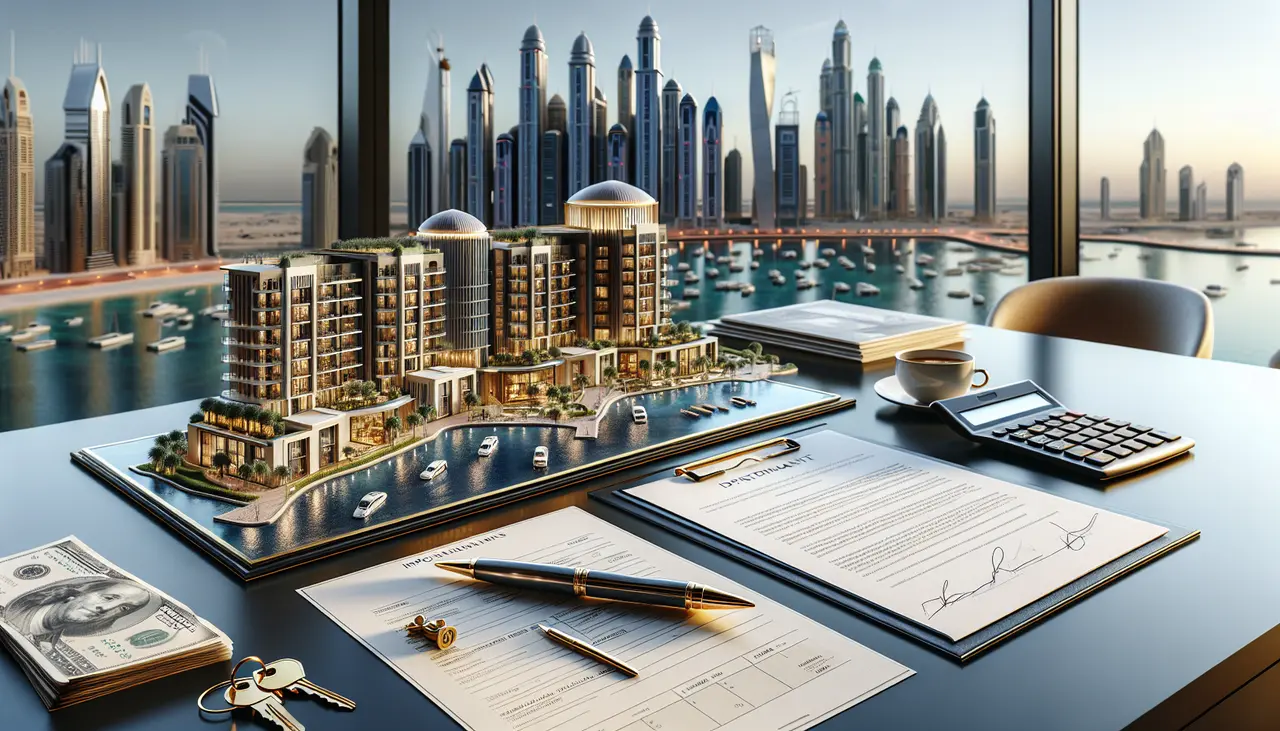The Ultimate Guide to Investment Apartments in Dubai: What You Need to Know
Introduction to Buying an Apartment in Dubai
Buying an apartment in Dubai might seem daunting at first, but it doesn’t have to be. This city is a hub for investors seeking stable returns and luxury living. Here’s the deal: Dubai’s real estate market is competitive yet rewarding. You’ve got a range of options from sleek, high-rise towers to serene, waterfront living spaces. The process starts with understanding your needs. Are you looking for a place to call home or an investment to grow your wealth? Once that’s clear, the hunt begins. Dubai caters to every taste and budget, whether you’re after the opulence of the Palm Jumeirah or the buzz of Downtown Dubai. But remember, investing here isn’t just about picking a property. You’ve got to get familiar with the laws and regulations. Fortunately, Dubai is pretty open to foreign investors. You can outright own properties in designated areas. And let’s talk finance. Getting a mortgage as an expat is straightforward, provided you meet the bank’s criteria. To sum up, buying an apartment in Dubai is all about research, understanding the market, and knowing your legal standings. Once you’ve got those down, you’re well on your way to securing your piece of this vibrant city.
Why Dubai? The Appeal of Investment Apartments
Dubai stands out on the global map for investments, especially for apartments. It’s not just the gleaming skyscrapers or the luxury lifestyle that pulls investors in; it’s the solid economic growth and political stability that make it a safe bet. The city promises high rental yields, often better than many major cities around the world. Imagine getting a return of 5% to 9% annually; that’s what Dubai offers. Plus, there’s no property tax. Yes, you read that right. Once you buy an apartment, you don’t have to worry about annual taxes on it. The government also offers resident visas to property investors, which is a cherry on top. Whether you aim for luxury spots like Palm Jumeirah or the bustling Downtown Dubai, the city caters to various preferences and budgets. And with Expo 2020 giving the market an extra boost, the prospects look even brighter. Investing in Dubai is not just buying a property; it’s securing your stake in a rapidly growing economic powerhouse.
What to Consider Before You Buy Apartment in Dubai
Before you dive into the bustling real estate market of Dubai to buy an apartment, there are key factors to consider. First, think about your purpose. Are you looking to live in it, or is it purely an investment? Your goal influences the location and type of apartment you should look for. Location matters a lot in Dubai; properties in downtown areas and near landmarks like Burj Khalifa often fetch higher rents and resale value. Next, research the property developer’s reputation and the project’s history. You want to invest in a project that’s delivered on time with quality construction. Understand the legal side too, especially about property ownership and visa regulations for expats, which can influence your purchase. Budget wisely, considering not just the purchase price but also additional fees – maintenance, service charges, and property registration fees. Finally, think long term. Dubai’s real estate market fluctuates, so consider the potential for growth and resale value down the line. Keep these points in mind, and you’re setting yourself up not just for a successful purchase but a smart investment in Dubai’s dynamic property landscape.
Understanding Dubai’s Real Estate Market Trends
Dubai’s real estate market is as dynamic as it is luxurious. It’s a vibrant mix of high demand for rental properties and an ever-growing skyline of sophisticated apartment buildings. What’s driving this market? A few key things: Dubai’s status as a global business hub, its no-tax policy on personal income, and its appeal to wealthy international investors. These factors make the city’s property market one to watch for both rapid value appreciation and strong rental yields. Historically, Dubai has seen periods of rapid growth followed by adjustments, but the long-term trend has been upwards. The expo boosted interest significantly, and while the world dealt with a pandemic, Dubai’s real estate began to bounce back quicker than expected. Most notably, there’s a shift towards sustainable and smart homes, mirroring global real estate trends. Prices fluctuate depending on the area; Downtown and Palm Jumeirah are on the pricier end, while newer developments like Dubai South offer more for those looking to get more bang for their buck. In essence, understanding Dubai’s real estate market trends requires keeping an eye on global economic indicators, local policy changes, and staying informed about new developments.
Types of Investment Apartments Available in Dubai
Dubai’s real estate market is hot, offering a variety of investment apartments to suit different tastes and budgets. First up, we have off-plan properties. These are apartments bought directly from developers before they’re built. Off-plan buys can be cheaper and offer high capital appreciation once completed. Then, there are ready-to-move-in apartments. Ideal for investors wanting immediate rental income, these properties are finished and ready for occupancy. Luxury apartments are big in Dubai, too. Think top-notch amenities, prime locations, and stunning views. They demand a higher price but offer exclusivity. Lastly, there are studio and one-bedroom apartments, perfect for single professionals or couples. They’re more affordable and typically in demand, making them a smart choice for new investors. Each type has its perks, so consider your goals and budget when choosing.
The Process of Buying an Apartment in Dubai
Buying an apartment in Dubai is straightforward but involves a few critical steps. First, decide if you want a ready-to-move-in option or if off-plan suits you better. Ready properties offer immediate possession but might be pricier. Off-plan properties, sold during or before construction, are often cheaper but come with a wait. Next, secure financing if needed. Most expats opt for a mortgage; know that banks in Dubai usually finance up to 75% for expats and 80% for UAE nationals, requiring a down payment for the rest. Then, find a reliable real estate agent. An agent with a solid track record in Dubai can guide you through listings, negotiate prices, and explain the legalities. After selecting your apartment, you’ll sign a Sales Agreement. For off-plan purchases, ensure the project is registered with the Dubai Land Department (DLD) and that your payments go into an escrow account. Finally, transfer ownership. This involves registering the property with the DLD, paying the necessary fees, and getting your title deed. Remember, apart from the apartment cost, set aside funds for registration fees, agent commissions, and possibly a maintenance fee deposit. With these steps, you’re on your way to owning a piece of Dubai!
Financing Your Dubai Apartment Purchase: Options and Considerations
Getting your hands on an investment apartment in Dubai requires not just vision but a plan to finance it. Whether you’re eyeing a swanky spot in the Marina or a cozy nook in Jumeirah Village, the question of money pops up. Fortunately, Dubai’s real estate market is fluid, offering multiple routes to secure your investment. Banks are the go-to for many, with mortgage rates in the Emirates being competitive. You might be looking at down payments of 20% to 25% for expats, and somewhat less for UAE nationals. But don’t just jump at the first option. Shop around. Interest rates and terms vary, and finding a deal that dovetails with your financial situation is key. Don’t overlook developer financing either. Some offer tempting terms to pull buyers in, sometimes even sidestepping bank hassles. Yet, this convenience may come with its trade-offs, like higher interest rates or less flexibility in loan terms. Bottom line here: weigh your options, consider the long-term implications, and choose wisely. Your path to owning a piece of Dubai’s vibrant landscape depends on it.
Legalities and Paperwork: What You Need to Know
Navigating the legal waters and paperwork when investing in a Dubai apartment is crucial. First, understand that foreign ownership is fully allowed in designated areas known as freehold zones. This means you can own property outright in these areas. For non-freehold zones, a 99-year lease is commonly offered. Key documents you’ll deal with include the Sales Agreement, also known as the Sale and Purchase Agreement (SPA), which outlines all terms of the sale. Make sure every detail is correct and in line with your understanding. You’ll also encounter the Title Deed, which is proof of ownership. Before any money changes hands, ensure this document is ready and verified. It’s equally important to be aware of the Dubai Land Department’s (DLD) role. They’re responsible for regulating real estate in Dubai and charge a 4% transfer fee on the property purchase price during the transfer of ownership. Always consult with a local property lawyer to navigate these legal aspects smoothly. Their expertise can save you from potential pitfalls and make the investment process transparent and efficient. Remember, cutting corners or skimping on professional advice in the realm of legalities and paperwork can lead to significant issues down the line. Play it safe, and get the right help from the start.
Tips for Successful Investment in Dubai’s Apartment Market
Entering Dubai’s apartment market as an investor is a promising venture, but it demands smart strategy and awareness. First, understand the landscape. Dubai teems with investment opportunities but doing your homework pays off. Consider the location’s demand and growth prospects. Areas closer to the metro, malls, and other amenities generally fetch better rental yields. Next, study the property types. From luxurious penthouses to cozy studios, knowing what renters prefer in different districts helps. Focus on long-term gains rather than quick flips. The real estate market can be unpredictable, but solid investments usually grow over time. Also, be aware of legal frameworks. Dubai has clear property laws that protect both local and foreign investors, but knowing these inside out is crucial. Finally, don’t overlook the importance of a reliable property manager. They can handle the day-to-day, ensuring your investment remains profitable. By keeping these tips in mind, stepping into Dubai’s apartment market can be less daunting and more rewarding.
Conclusion: Making an Informed Decision to Buy Apartment in Dubai
Buying an apartment in Dubai is a big decision. It’s vital to weigh all aspects. The city’s real estate market is attractive with potential for good returns. However, there are factors like location, property value trends, and rental yields to consider. Be smart. Research is key. Understand the laws and regulations, especially for foreign buyers. Consider the type of apartment and the community it’s in. Think long-term. Are you looking for quick profits or a steady income from rent? Dubai’s property market can be rewarding if approached with caution and due diligence. Don’t rush. Take your time to find the right investment for you. When in doubt, seek advice from real estate experts in Dubai. Making an informed decision is crucial. Your investment should align with your goals and financial plans.

